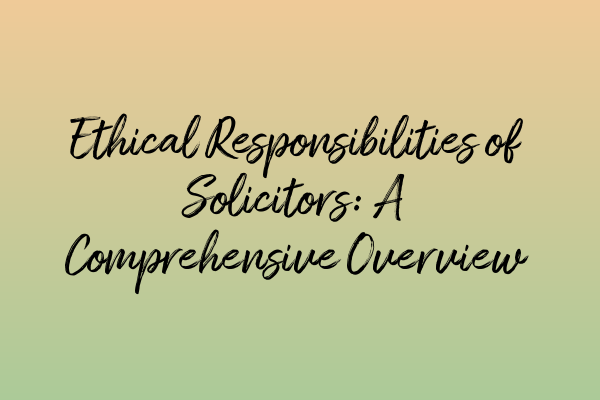Ethical Responsibilities of Solicitors: A Comprehensive Overview
As solicitors, we have a fundamental duty to uphold the highest standards of ethics and professionalism in our practice. Our role as legal professionals entails not only providing legal advice and representation but also ensuring that our clients’ rights are protected and that justice is served. In this comprehensive overview, we will explore the ethical responsibilities that solicitors have and the importance of adhering to these principles.
1. Confidentiality and Privilege:
One of the most crucial ethical duties of solicitors is maintaining the confidentiality and privilege of client information. Clients must trust that the information they disclose to us will remain confidential. Breaching this duty can have severe consequences, not only for the client but for our professional reputation as well. Therefore, it is imperative to handle all client information with the utmost care and take necessary precautions to protect their privacy.
2. Conflict of Interest:
Another significant ethical responsibility solicitors must adhere to is avoiding conflicts of interest. We must always act in the best interests of our clients and avoid any situations where our personal interests may interfere with our professional obligations. Identifying potential conflicts of interest early on and taking appropriate measures to address them is essential to maintain client trust and ensure the integrity of our practice.
3. Competence and Continuing Professional Development:
As solicitors, we have a duty to provide competent and diligent representation to our clients. This includes staying up-to-date with changes in the law and continuously improving our knowledge and skills. Engaging in continuing professional development activities, such as attending relevant seminars and conferences, is essential to enhance our legal expertise and ensure that our clients receive the best possible legal assistance.
4. Independence and Integrity:
Solicitors must maintain independence and integrity when representing clients. We should not allow outside influences or personal biases to compromise our professional judgment. Clients rely on us to provide objective and unbiased advice, and it is our duty to fulfill this obligation. Upholding independence and integrity is crucial in preserving the trust and confidence of our clients and the public.
5. Duty to the Court:
Solicitors have an ethical duty to the court and the administration of justice. We must act honestly and with utmost integrity in all our dealings with the court. This includes presenting only valid and admissible evidence, avoiding any form of dishonesty or deception, and respecting the court’s authority and decisions. Our commitment to the administration of justice is paramount, and we must ensure that our actions reflect this commitment.
6. Duty to the Profession:
As solicitors, we have a responsibility to maintain the reputation and integrity of the legal profession. This involves adhering to the Solicitors’ Regulation Authority (SRA) Code of Conduct and acting in a manner that promotes trust and confidence in the profession. Engaging in unethical conduct not only affects our own reputation but also undermines the public’s trust in the legal system as a whole.
In conclusion, solicitors have a multitude of ethical responsibilities that underpin their professional practice. Upholding confidentiality, avoiding conflicts of interest, maintaining competence, independence, and integrity, honoring duties to the court and the profession are all part of our duty as legal professionals. By adhering to these ethical principles, solicitors can preserve the trust of their clients, protect their professional reputation, and contribute to a fair and just legal system.
For more information on related topics, please refer to the following articles:
– SQE Prep: Tips and Tricks to Excel in Criminal Law
– Cross-Examination Techniques: Mastering the Art of Questioning
– Private Prosecutions: Exploring Non-Governmental Prosecutions in Criminal Cases
– Ethical Challenges in Criminal Defence: Navigating Dilemmas
– Assault and Battery Laws: Understanding the Legal Parameters


Leave a Reply